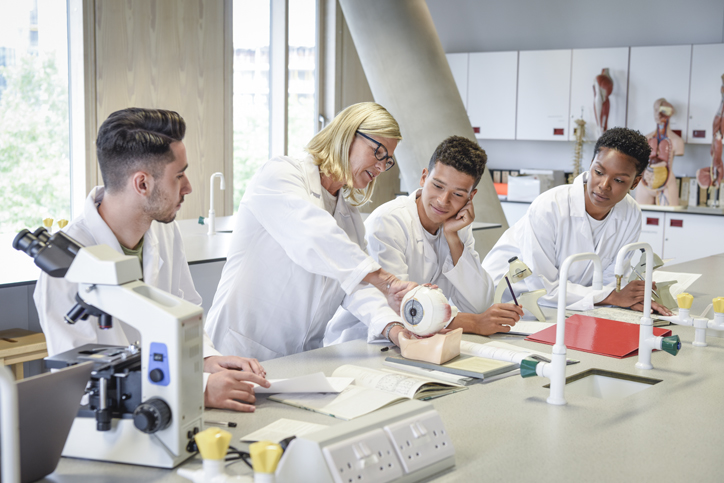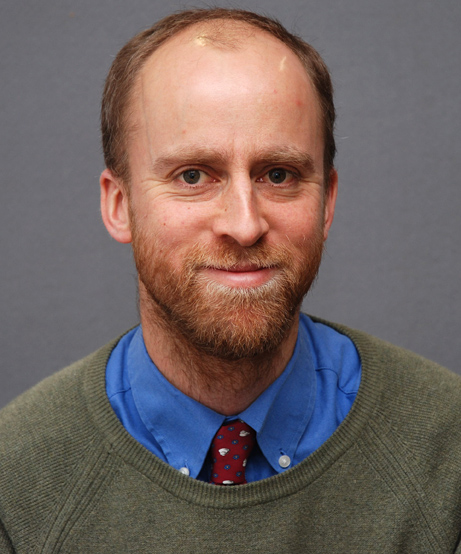25 FEBRUARY 2020
Top tips on teaching Cambridge International AS & A Level science

How do you make teaching Cambridge International AS & A Level science as demanding and thought-provoking as your efforts to teach Cambridge IGCSE™?
By getting the students to do the thinking.
When you’re trying to make students engage with a concept:
- Encourage talk at the start of the lesson, so you’ve got interactive dialogue between you and the students
- Give them something that allows them to work it out for themselves or to work through it for themselves
This means you’re:
- Engaging with their prior knowledge
- Getting good exploratory talk happening
- Getting them to learn
You could try employing the principles of assessment for learning (AFL). This will mean you:
- See the learner as autonomous
- Develop that autonomy
- Get the students to work together in pairs or groups
- Give them feedback, so you know where they’re starting from and where they are going to
This involves clarifying your learning intentions at the start of lessons and getting the students to reflect back on what they’ve learnt at the end of lessons. It’s no different than when you teach Cambridge IGCSE™, it just requires you to engage your students in deep and exploratory thought.
Developing essential science skills
Getting students to really think is one of the big aims of science education; we want to develop new scientific minds who are passionate about science when they leave education. You are fostering:
- Their critical thinking
- Their data analysis skills
- The way they interpret data and make sense of data as part of enquiries
Basically, don’t be hijacked by the specification and don’t allow content knowledge to rule your teaching. Really think about those key skills that the students will take forward into scientific careers. It’s that kind of thinking that makes science lessons enjoyable at Cambridge International AS & A Level or Cambridge IGCSE. It will make students think that science is really for them and that’s what we want to achieve.
Challenges
Practical work
One key part of teaching Cambridge International AS & A Level science is practical work. Finding equipment can be a challenge. However, if you see the opportunity for practical work, see if you can do it. There are a lot of kitchen chemistry experiments you can do. There are also a lot of normal resources you can employ to get the same learning outcome as practical work. But be selective in what you ask you Head of Department for, because as you will know they won’t pay for everything!
Really think:
What will students learn from practical work?
Is it therefore worth doing?
If it is, really make the case for getting that equipment. There are two key things that students get out of practical work:
- Learning of conceptual work
- Learning ‘How to do’ – How to do science, how to interpret data and how to think
Both are equally important.
Time
The other challenge is time. Specifications are often very full of content knowledge. But look in the specification because the ‘application of knowledge’ is just as big as the content knowledge itself. Think how you can prepare your students for the whole specification and that will diversify your teaching. So that rather than you having to do everything, you get your students to do most of the work for homework and in class, which will result in them learning more.
Student Attitude
It can be difficult to teach students that it’s their responsibility to ‘do’ the thinking and the learning. So, when you design activities for them to do -- to think through the ideas you want them to come to -- the best way is to design activities that generate notes. When students go home, they know they’ve got materials to revise from, but in the class they really learnt by thinking.
Transitioning between Cambridge IGCSE™ and Cambridge International AS & A Level
Some teachers may find that when students arrive in your Cambridge International AS & A Level class they don’t have many practical skills. So, it’s a good idea to focus on developing those skills at the start of the year.
Really think about what they learn to do in the practical activities and structure them so you’ve got a matrix. This will tell you what you think they’re going to learn in terms of skills and competencies, as well as what you think they’re going to learn in terms of conceptual ideas.
Some teachers even do a two-lesson course in practical ideas at the beginning of the year. You can also ask students to record their own practical skills handbook that they start at the beginning of the year. But really do think about it, because feeling unskilled for a student can be a barrier to their engagement in practical activities and so making them feel confident is really important.
To hear more from Mark and ask him your science teaching questions, sign up for his webinar on 4th March 2020.
 |
Dr Mark Winterbottom is a Senior Lecturer in Science Education at the Faculty of Education, University of Cambridge. Mark co-leads the secondary PGCE course, teaching on the science and biology programmes. His research interests are in learning through inquiry, and in 'out-of-the-classroom' approaches to science education. He's also appeared as a special guest on our active learning episode of the Brighter Thinking Pod! |
Thank you for your feedback which will help us improve our service.
If you requested a response, we will make sure to get back to you shortly.
×